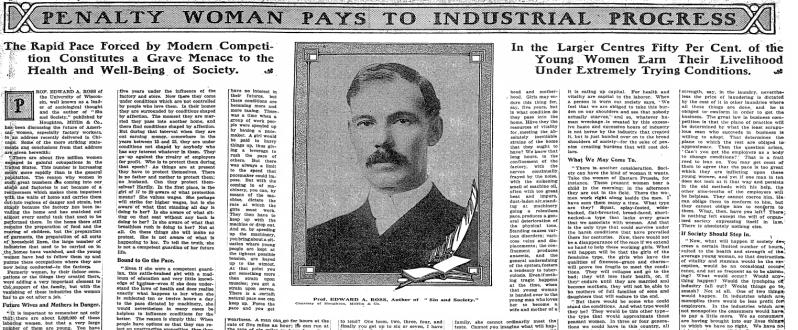
The New York Times’ archives have proved abundantly illuminating this morning. It’s like the Twilight Zone; I don’t understand how our history has become so warped and misunderstood.
It was the emerging market, not the government, which equalized women’s footing with men and in fact, it was government legislation, often pushed by progressives, which tried to push women a few steps back.
Consider the following excerpts from two different articles:
“Penalty Woman Pays to Industrial Progress,” published May 03, 1908, a printing of Professor Edward A. Ross’s speech to Chicago, a progressive, a sociologist and a eugenicist (as progressives tended to be at the turn of the century).
“Can they [referring to women] protect themselves? Hardly. To tell the truth, she is not a competent guardian of her future life. Now, what is the effect of working young women…it is draining them of that stamina and vitality which ought to be saved to enable them to face successfully the strains and burdens of wifehood and motherhood.”
Ross also worried that work would destroy the “grace we’ve come to associate with women.”
Compare that to the following from, “Women’s Work Limited by Law: Equal Opportunity League Fighting Legislation Which Restricts Their Hours of Labor,” published January 18, 1920:
“In appeals to the Legislature, the league [which represents more than 20,000 women and supported by a host of other women’s organizations] complains of cases of severe financial loss, deprivation of the right to choose the most favorable hours of employment, and in some cases, the compulsory abandonment of profitable trade to enter upon…”
Moreover, they worried about legislation that wouldn’t let women work at night since many women worked at night so as to be with their children during the day. Now suddenly they had to find work during the day.
“I am not asking for sympathy,” Mrs. Terryberry said, “but for an equal right with men to earn my own living in the best way open and under the most favorable conditions that I could choose for myself.”
She worked at night and lost her job due to the aforementioned legislation, saying, “Ticket selling in the subway may not be an ideal vocation, but it was mighty satisfying to me to draw that $33 a week while it lasted.”
From the League itself: “So-called ‘welfare’ legislation is not asked for or wanted by real working women. These ‘welfare’ bills are drafted by self-styled social uplifters who assert that working women do not know enough to protect themselves, aided by a few women who once worked but who are now living of the labor movement.”
Continuing, “Making it a crime to employ women even five minutes after the eight-hour day kills the principle of equal pay for equal work.”
What an astonishing quote that is, utilizing a common refrain today but in a much different context back then.
On the minimum wage, “It is a well-known fact that a minimum wage always becomes the maximum, and that such a bill, affecting women only, while purporting to be for their benefit, would really be a serious handicap to them in competing with men workers for desirable positions.”
In conclusion the League states, “These proposed bills and laws, ostensibly intended to protect and shield the women worker, will, if permitted to stand, unquestionably work her industrial ruin and throw her back into the slough of drudgery out of which she is just emerging after centuries of painful, laborious effort to better her condition.”
That is the core of progressivism, especially turn-of-the-century eugenicist-backed, wonky science, sounding like 1950s Religious Right conservatism, progressivism: we know what’s best for you and we are going to shove it down your throat.

